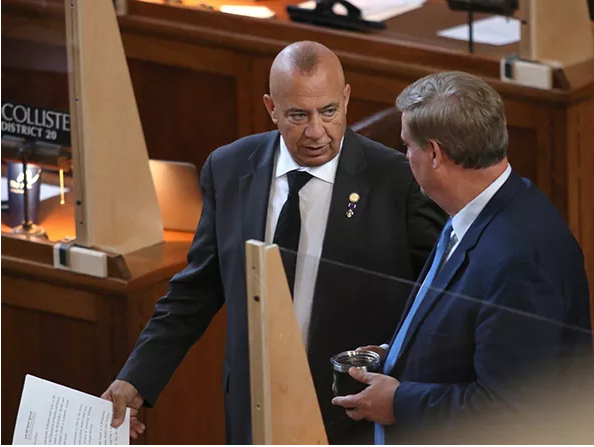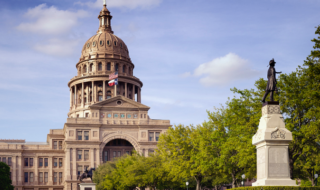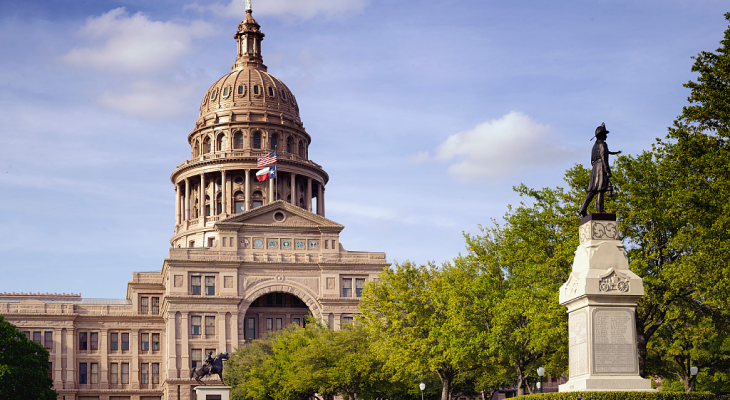April 30, 2021
Nebraska Legislature Down to Last 20 Days of Regular Session
State Director Bob Hallstrom reports from Lincoln on the small-business agenda for the legislative and political week ending April 30
Time is winding down on the 2021 Legislative Session as lawmakers have completed 70 days of the scheduled 90-day session. The past week saw a successful filibuster defeat a private school tax credit bill (Legislative Bill 364) and advancement of a bill (Legislative Bill 103) to provide the State funds ($2 million in each of the next two years) to assist Gage County in satisfying the Beatrice 6 judgment.
Multiple Spending and Tax Measures Advance
The following measures supported by NFIB were advanced to the second round of debate this week:
- Legislative Bill 388 – Nebraska Broadband Bridge Act: Introduced by Sen. Curt Friesen (Henderson) and designated as a priority bill by Speaker Mike Hilgers (Lincoln), LB 388 would appropriate $20 million annually, beginning with fiscal year 2021-22 to facilitate and fund the development of broadband networks in unserved and underserved areas. The bill would create grants to be used for development costs for a qualifying project and require matching funds from political subdivisions making application for a grant, equal to 50 percent of the total development costs.
- Legislative Bill 432 – Corporate Income Tax Parity: As amended, LB 432 introduced and designated as a priority by the Revenue Committee would create parity between the highest marginal individual income tax rate of 6.84% and the top marginal corporate income tax rate by reducing the tax rate on corporate income in excess of $100,000 from 7.81% to 6.84% beginning January 1, 2022. Nebraska’s corporate income tax currently has two brackets. The first $100,000 of taxable income is taxed at 5.58%, with all taxable income in excess of $100,000 taxed at a marginal rate of 7.81%.
The corporate income tax amendment was adopted on the following vote of 30–7:
Yes: Senators Aguilar, Albrecht, Arch, Brewer, Briese, Clements, Day, Dorn, Erdman, Flood, Geist, Gragert, Halloran, B. Hansen, Hilgers, Hilkemann, Kolterman, Lindstrom, Linehan, Lowe, McCollister, McDonnell, Moser, Murman, Pahls, Sanders, Slama, Stinner, Wayne and Williams.
No: Bostelman, Brandt, Friesen, Groene, M. Hansen, Hughes and Hunt.
Present – Not Voting: Senators Blood, Bostar, J. Cavanaugh, M. Cavanaugh, DeBoer, Lathrop, Morfeld, Pansing Brooks, Vargas, Walz and Wishart.
Excused – Not Voting: Senator McKinney
- Legislative Bill 64 Taxation of Social Security Benefits: Introduced by Sen. Brett Lindstrom (Omaha), and designated as a priority bill by Sen. Mark Kolterman (Seward), LB 64 would provide, for tax years beginning on or after January 1, 2021, for a phased-in reduction of income taxation of Social Security benefits by 5 percent, increasing to 20 percent in 2023 and increasing by 10 percent each year thereafter until federal adjusted gross income is reduced by 100 percent of the benefits for tax years beginning on or after January 1, 2030.
The Legislature will have to make some tough decisions regarding spending measures and tax relief proposals as the fiscal impact of bills that have advanced to the floor of the Legislature currently exceed the amount of funds available.
Workers’ Compensation Bills to be Considered
While it has been a relatively quiet session with respect to workers’ compensation legislation, a few WC bills have surfaced on the “Consent Calendar” agenda. Consent Calendar is a streamlined process to allow for quick consideration of non-controversial legislation (bills advanced without any dissenting votes and no opposition testimony). Under the Consent Calendar process, unless three senators file a request to “pull” a bill from the Consent Calendar agenda, after no more than 15 minutes of debate, a vote is taken on advancement of the bill to the next round of debate.
The following workers’ compensation bills will receive consideration Tuesday morning:
- Legislative Bill 256 – Workers’ Compensation – Approval of Lump-Sum Settlement: LB 256, introduced by Sen. Matt Hansen (Lincoln) on behalf of NWCEF, would clarify that a release of a lump-sum settlement for indemnity benefits only, that is not required to be submitted for approval by the Compensation Court, need not contain allegations regarding eligibility for Medicare if the employee’s right to receive future medical, surgical, and hospital services is specifically excluded from the settlement and Medicare has not paid medical, surgical, or hospital expenses or if Medicare has paid medical, surgical, or hospital expenses for which it claims it is entitled to reimbursement and Medicare has been reimbursed for such expenses at the time the settlement is executed. (NFIB Position-Support)
- Legislative Bill 407 – Workers’ Compensation – Mental Injuries/Mental Illness: Sen. Mike McDonnell (Omaha) has introduced legislation advanced to General File which would allow county correctional officers in a high population county (more than 300,000 inhabitants) to recover benefits for workplace mental injuries and mental illnesses unaccompanied by physical injury. (NFIB Position-Watch)
Other Bills of Interest
- Legislative Resolution 11 Constitutional Amendment – Consumption Tax: LR 11CA, introduced and designated as a priority bill by Sen. Steve Erdman (Bayard), is expected to be debated on the floor of the Legislature early next week. LR 11CA is a proposed Constitutional Amendment that would overhaul the state system of taxation by repealing the state’s corporate, income and property taxes, and replacing them with a new consumption tax levied on the purchase of services and new goods. (NFIB Position – Oppose)
Economic Forecasting Advisory Board
The Nebraska Economic Forecasting Advisory Board voted to increase revenue projections during a meeting held on Thursday. The Board serves in an advisory role in forecasting General Fund receipts that are utilized by the Legislature to prepare the state’s budget. The Board raised revenue projections for the current fiscal year by $90 million to $5.6 billion. The adjustment was based on anticipated increases of $65 million in corporate income tax receipts and $25 million in individual income tax receipts.
Total projected revenue receipts for the next two years were lowered by $5 million. The new forecast provides the Legislature with $245 million of unobligated revenues and if actual tax revenue meets projections, $358.7 million would be dedicated to property tax credits resulting in over $1.5 billion to direct property tax relief over the next two fiscal years.
Previous Reports and Related Information
- April 2—Tax Reform/Relief Bills Advance
- February 26—A $20-an-hour Minimum Wage?
- February 12—NFIB Members Weigh in on Paid Leave Bill
- January 15—The Legislative Bill Mill Starts Turning

NFIB is a member-driven organization advocating on behalf of small and independent businesses nationwide.
Related Articles


















